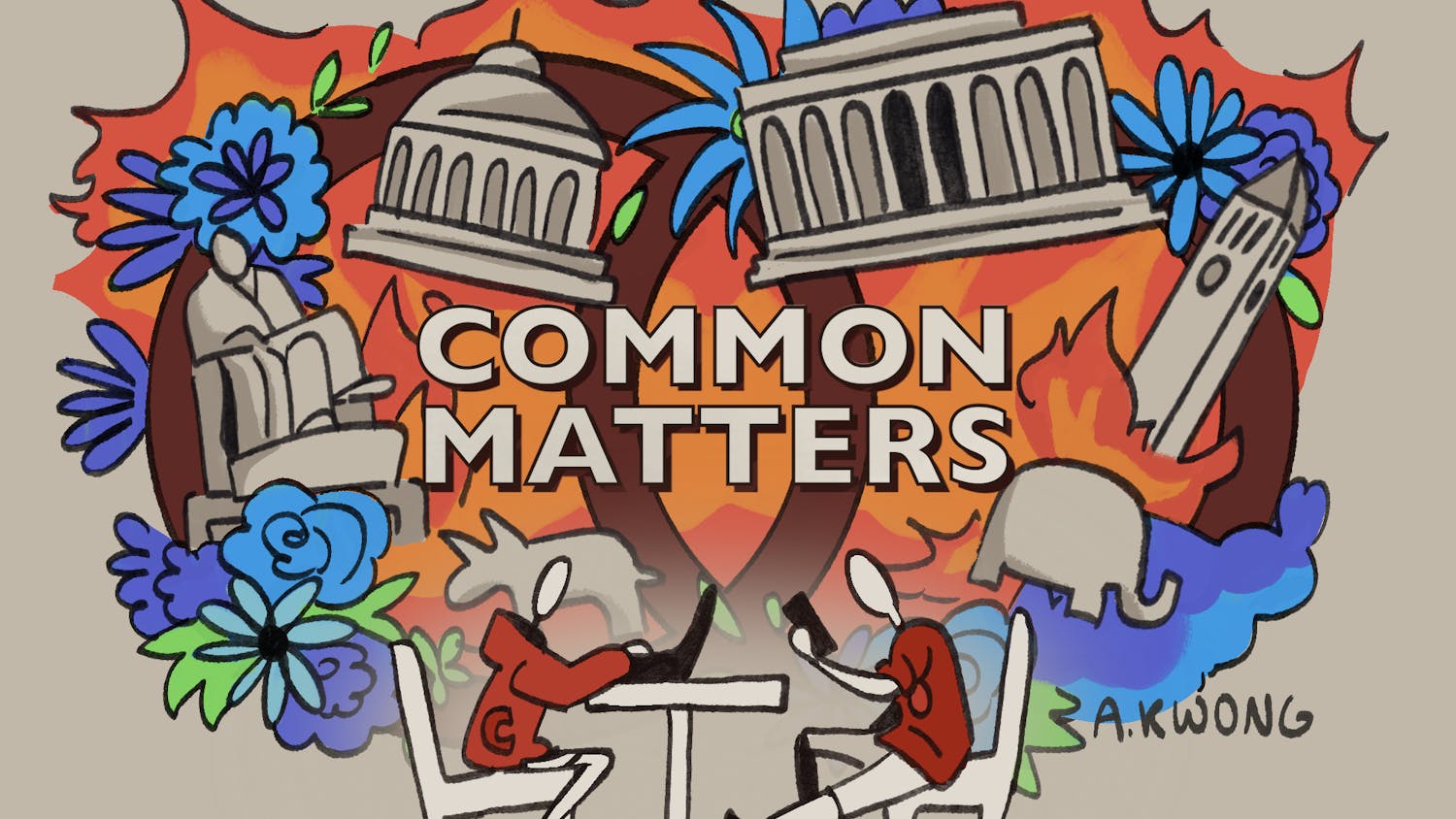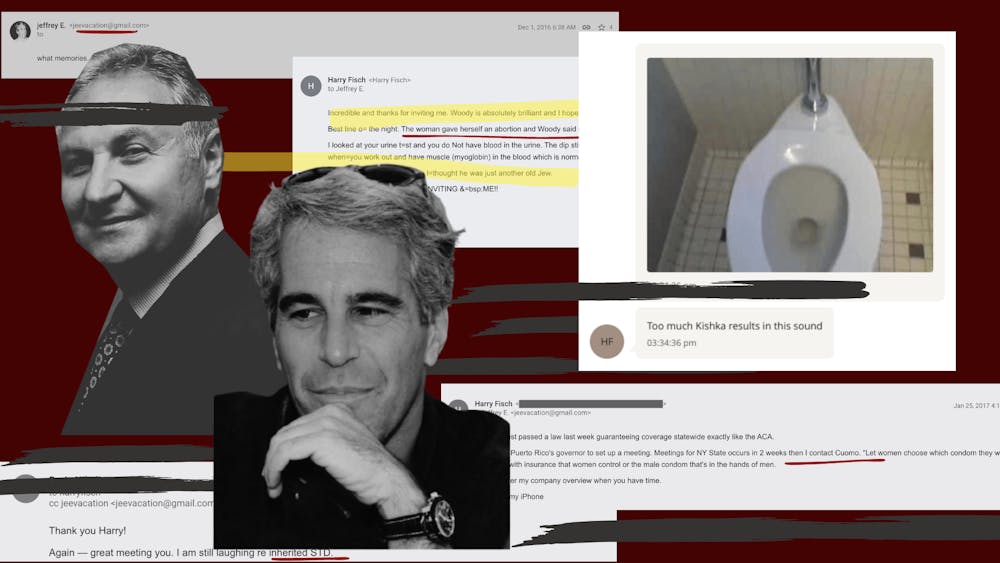The Power to Evict
I write today at around 2:30 a.m. from an air mattress in the home of a trusted friend. I am surrounded by a completely disorganized set of my belongings — an acoustic guitar, a stack of leaflets from the union campaign I worked on over the summer, old notebooks and journals. Nobody tells you what to grab when you’re being evicted and fear your combination college-employer-landlord may confiscate whatever you leave behind. The expensive stuff? The irreplaceable stuff? There’s no one right answer — but I do wish I had remembered a toothbrush.
At around 6 p.m. yesterday, I left my dorm room for a meal. Having been temporarily suspended by the University for my alleged involvement in the Liberated Zone on the Arts Quad, I am effectively on house arrest. I can be present in my room and in dining halls, but it would be considered trespassing were I to go anywhere else on campus without being granted a temporary exception by the Office of Student Conduct and Community Standards. I’ve submitted a number of requests for temporary exceptions to better understand their scope, and have now been denied exceptions to participate in negotiations with administration related to the Liberated Zone, to attend a press conference on the recent student and graduate student worker suspensions held by Cornell Graduate Students United and to boulder on the Lindseth Climbing Wall (worth a shot).
When I returned to my building after eating dinner, I scanned my ID to enter and did not hear the familiar sound of the lock clicking into place. I took a deep breath, doing my best not to think of the 50 Barnard College student organizers who were evicted from student housing and given just 15 minutes to retrieve their possessions. I tried another door to my building. Still no click. I began to panic. I was lucky enough to have a professor whom I deeply trust nearby, and I quickly told them what was happening. The professor assisted me in finding residence hall staff, who recognized me as a recently suspended student and seemed to share a sense of anxiety about what may be happening. I was given a temporary ID for my building and was directed to return it when I no longer needed it. I ran home, calling friends to ask for their help in clearing my room.
Just minutes after I began contacting friends for help, nearly ten of them appeared to help me move out and another offered a guest room in their home. I began haphazardly throwing items into boxes and bags, distributing large furniture to various hallmates, and determining what I could tolerate leaving behind. As I loaded the last of my chosen possessions into cars, I emailed OSCCS director Christina Liang the most even-keeled email I could muster in a moment of such panic: “Hello, I live in [dorm] and my keycard is no longer working. Am I being evicted? As ever, Nick.”
The Power of Community
On the day prior, I was called into a meeting with Ms. Liang in Day Hall to discuss the terms of my suspension. In this meeting, I was offered a deal. Rather than being “de-enrolled” from the University, receiving no credit for my months of work this semester without refunding my tuition, I could be given “incomplete” grades, receiving credit for my current courses if I completed my remaining work once my suspension is lifted. In exchange, I would have to sign an agreement not to “facilitate, engage in, participate, or assist in” the Liberated Zone in any way. Liang clarified that this would include remotely supporting the encampment, publicly encouraging students to support or join the encampment and even potentially supporting similar protest actions on other campuses. In Cornell’s Freedom of Expression theme year, the University attempted to buy my silence with academic credit — likely valued over $100,000, taking into account this semester’s wasted tuition and the ninth semester I will likely be forced to add. But the only idea more sickening to me than wasting a semester’s worth of hard work and tuition was the prospect of putting my values up for sale, abandoning my friends in the Liberated Zone and leaving behind a global student movement to stop the ongoing genocide in Gaza.
It was only by the time I had reached my friend’s home that I received a reply from Liang, which indicated that my keycard “was not supposed to be turned off” and that its deactivation “was done in error.” I have never had problems entering my building with my keycard before, and this “error” occurred immediately after I rejected OSCCS’ bribe and publicly released its contents. I am extraordinarily hesitant to believe that these events were unrelated to my card’s deactivation. Even if unintentional, my eviction severely disrupted my life — and in fact, this was not the first time this week the University has exploited its power to kick me out of my home. Upon my initial suspension on Friday, I was told I was no longer welcome in University housing pending a “short-term grace period” of undefined length. OSCCS did not answer when I repeatedly called their office to clarify the length of this period, so I stayed up through Friday night packing and agonizing over whether “short-term” meant Barnard’s fifteen minutes, a few hours or long enough for me to find a room of my own. And with the noxious atmosphere of fear, intimidation and suppression on campus as of late, I must imagine most would have had a similar reaction in my position. Thanks to a massive outpouring of support from faculty, CGSU, and the student body as a whole, the University reversed their initial attempt to evict me.
Up at the Liberated Zone, we’re watching a very important development in Cornell history occurring in real time. As more and more students scrutinize our University’s investments in genocide, its disproportionate and aggressive targeting of pro-Palestine students and its refusal to adequately protect our Arab and Muslim peers, a new kind of divestment is occurring — the divestment of our labor from Cornell University. As I remarked to members of the encampment after my suspension, the University is dependent on the work of faculty, staff and students — but could likely get along just as well without the work of the top-level administrators, donors and trustees calling the shots. When faculty members are holding class within the encampment, and students are skipping class to learn from their peers within it, our People’s University becomes more legitimate than Cornell. This became explicitly clear to me yesterday.
When I was suddenly driven into a state of crisis, I knew that I could not rely on my University to protect me — in fact, it was clear to me that the University’s actions were a part of a coherent intimidation campaign against my peers and I. I am grateful for the individual members of Cornell staff and administration who advocated for me and resolved my eviction as soon as they were able — but the supposed original error emerged from a much broader context of suppression and intimidation. When I needed a community to defend me, it was my classmates from the People’s University who ensured I was safe, housed and mentally at ease. Especially in a company town like Ithaca, where Cornell has the capacity to deny students like me food and housing with a keystroke, the administration has a moral responsibility not to abuse that power in attempts to silence speech. But after the two additional suspensions yesterday, bringing us to a total of six suspended students, the crackdown appears to have become policy.
The Power to Resist
My eviction was incredibly stressful, and the University’s decision to weaponize their control over where I can feel safe and comfortable is one I will not soon forget. As I scrambled to remove my most sentimentally valuable belongings from my room, however, I thought of the 1.7 million Gazans — 80% of Gaza’s population — who have so far been displaced from their homes. They have been forcibly removed by Israeli forces through the use of arms sold by the US federal government and manufactured, in part, with your tuition dollars. Every one of those 1,700,000 individuals had to decide in a panic which books, letters or photos were worth keeping — all while also ensuring they carried enough food, water and supplies to survive their harrowing path forward. For someone like me, being kicked out of my home means having to impose on my friends for a few days while I get back on my feet. For the people of Gaza, eviction means leaving lifelong communities of care, generally for destinations that are unplanned or unclear. Over a million of the displaced population have fled to Rafah, a Southern city that Israel has long identified as a safe zone for escaping civilians. Despite this, Israel appears ready to invade Rafah in the coming days — breaking their word by waging war on a city of refugees.
In both of my two scrapes with eviction this past week, I have been overwhelmed with texts and phone calls offering couches to sleep on, hot meals and just familiar company. For those who are moved or outraged by my experience, I have two messages I would like to share.
First, university repression cannot hold a ≤6 inch candle to the horrors our tuition dollars are supporting in Gaza. The amount of risk I and the other suspended students have taken on in the name of this cause does not come from a place of moral superiority — it comes from a deep sense of outrage over the ongoing genocide. There are no words for the visceral horror that comes with watching video coverage of what’s happening in Gaza, or reading about the likes of children being forced to have limbs amputated without anesthetic after being hit with shrapnel from airstrikes. Do not look away from Gaza, and let your shock at such images drive you to action — not despair. Direct action against our University’s material support for the Israeli occupation is a moral necessity given the gravity of what we are up against.
Second, a thought that required me giving up a semester’s worth of academic credit to legally share publicly: Join the encampment. Cornell would not be harassing students like me and escalating suspensions of perceived movement leaders if they were not deeply threatened by the strength of our movement. Students can only be kept safe, and our demands can only be won, through growing our numbers and defending our peers. It falls to you to get involved, on Cornell’s campus or the encampment nearest you.
Divest now, and free Palestine.
Nick Wilson is a second-year undergraduate student in the New York State School of Industrial & Labor Relations at Cornell University. He is an organizer with the Young Democratic Socialists of America’s Cornell chapter and Cornell’s Coalition for Mutual Liberation. He can be reached at nww27@cornell.edu.











